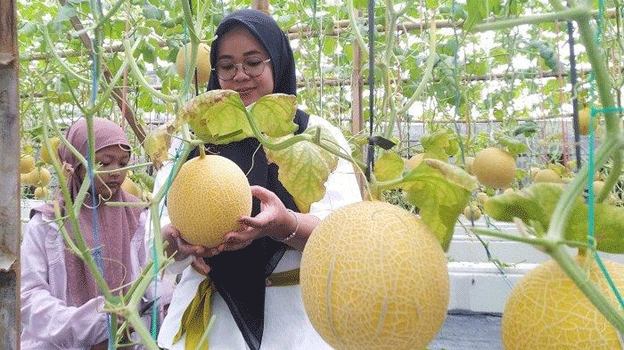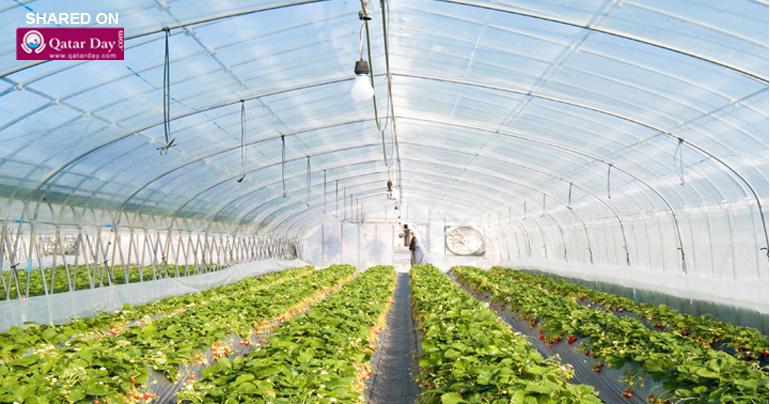In a significant step toward agricultural entrepreneurship, Pondok Pesantren Fastabiqul Khoirot in Banyumas, Indonesia, has initiated a unique hydroponic melon cultivation program. Launched as part of a grant from the 2024 DRTPM Kemendikbud Ristek program, this initiative aims to foster a green economy by equipping students with skills in modern, sustainable farming. The training, held on September 14, 2024, brought together 20 students for a hands-on session on melon cultivation using hydroponic systems.
Dr. Darojat, the program leader, explained the rationale behind choosing melons for this initiative. “Melons are a highly popular horticultural crop in Indonesia, but their cultivation faces challenges such as weather dependency and high production costs. Hydroponics offers a solution to overcome these barriers, especially when done in a controlled greenhouse environment,” he said.
Hydroponics: A Game-Changer in Melon Cultivation
Hydroponics is an innovative agricultural method that allows plants to grow in water-based, nutrient-rich solutions without the need for soil. According to Yongki Fajar Maulana, a specialist and trainer in the program, hydroponic systems offer several advantages over traditional farming methods. “Hydroponic farming ensures cleaner production, more efficient use of fertilizers and water, and the ability to grow crops regardless of the season. This makes it an ideal solution for melon cultivation, ensuring high-quality yields,” Yongki said during the training.
Data from the Food and Agriculture Organization (FAO) supports the benefits of hydroponics, noting that such systems can use up to 90% less water than traditional soil-based agriculture. Furthermore, hydroponics allows farmers to maximize land use by growing crops vertically in smaller spaces, which is crucial in land-scarce regions like parts of Indonesia. The global hydroponics market is also expanding, driven by the need for efficient, sustainable farming practices in an era of climate change and limited arable land.
Economic and Environmental Impact
For Pondok Pesantren Fastabiqul Khoirot, the benefits of this hydroponic melon program extend beyond agriculture. The pesantren’s leadership sees it as a vital tool for economic empowerment. Mintaraga Eman Surya, the pesantren leader, expressed optimism that the cultivation of hydroponic melons will not only provide students with valuable agricultural skills but also generate additional income for the pesantren through melon sales.
The first harvest of these melons is expected within 70 to 80 days, according to Teguh Pribadi, a member of the community outreach team. However, he emphasized the importance of maintaining a stable water supply and ensuring a continuous 24-hour power source to support the nutrient pumps critical to the hydroponic system. “This project is not just about learning; it’s about creating a sustainable business model for the pesantren. We hope to establish this as a pilot project that can be replicated in other pesantren across Indonesia,” Teguh said.
Hydroponics and the Green Economy
The integration of hydroponic farming into the pesantren’s curriculum marks a broader effort to promote environmental stewardship and economic self-sufficiency. By adopting hydroponics, the pesantren aligns itself with Indonesia’s growing green economy movement, which encourages environmentally friendly practices in various sectors, including agriculture. Hydroponic farming reduces the need for chemical inputs, minimizes water wastage, and eliminates the need for large tracts of land, making it a more sustainable agricultural approach.
This initiative also plays a crucial role in preparing students for the future. As Bruder Kris, head of SMAK Syuradikara (another pesantren with hydroponics education), pointed out in a separate initiative, teaching young people modern agricultural techniques equips them to meet future food security challenges. With Indonesia’s population continuing to grow and climate challenges affecting traditional farming, hydroponics could be a key technology for ensuring food production in the decades to come.
The hydroponic melon cultivation project at Pondok Pesantren Fastabiqul Khoirot is a model of how modern farming techniques can be applied in educational and religious institutions to foster both economic and environmental sustainability. By training students in hydroponic farming, the pesantren is not only providing them with practical skills but also creating a blueprint for future agricultural success. This initiative could pave the way for similar projects across Indonesia, contributing to the country’s broader goals of green economy development and food security.












